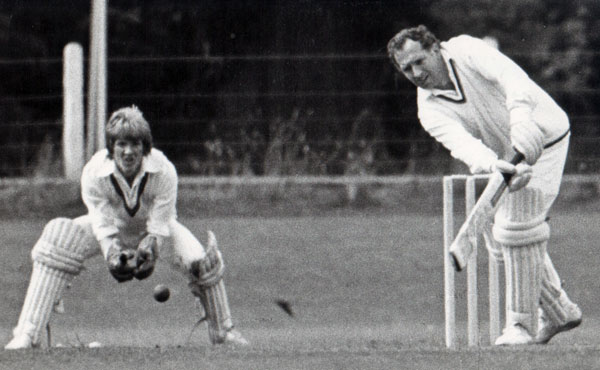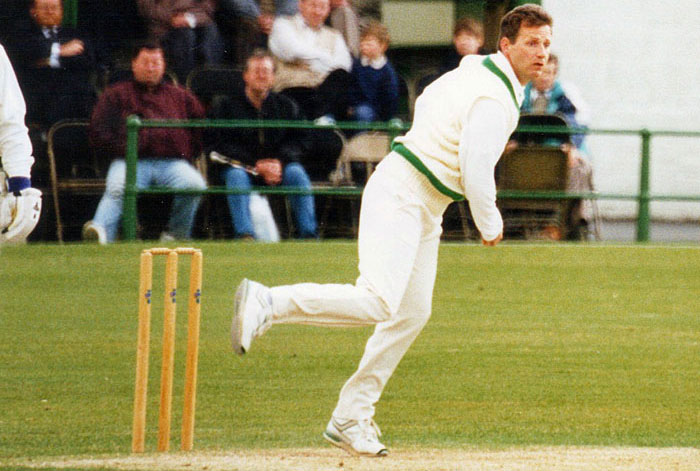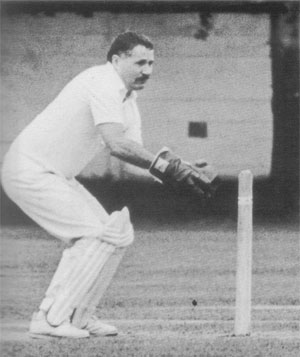In the beginning was Roy. Then came Jim, Deryck and finally Garfield, who last season really hit the high spots as an off-spinner and propelled the Harrison clan right back into the limelight where they have been, more or less, for over two decades now, contributing in varying degrees to Ireland's fortunes. Ian and Barry, both of whom just missed out on international recognition, and of course the four who did make it, have donated prodigiously of their time and talent to Waringstown's welfare over the same exciting period. The Harrisons are a family unique in the annals of Irish cricket.
 Roy Harrison batting for Waringstown
Roy Harrison batting for Waringstown
All six played together on the Waringstown XI for the first time in 1977 when, for an early-season match against Lisburn at The Lawn, Garfield, who had just celebrated his 16th birthday joined his brothers for his senior debut. From Roy, the eldest, to Garfield, the youngest, they always gave of their best whether playing for club, province or country. Roy, the most combative of the six, inexplicably represented Ireland only three times and on the only occasion he opened the batting top scored with 40. Worse batsmen have played more often for Ireland and he does have the distinction of being the first to reach 1,000 runs at interprovincial level.
It seems only yesterday that I watched in admiration as Roy, at the age of 43, compiled a gritty 75 not out, capture two cheap wickets and bring off a remarkably athletic catch — indeed all five Harrisons in action that day in 1983 each took a catch — to give Waringstown a Schweppes Cup quarter-final victory over The Hills at Milverton. Roy had just returned from holiday and, in the absence of Robbie Dennison, Ivan Anderson and Charlie McCrum, typically turned out at short notice, full of determination to beat the Dubliners, who around that time were building a lofty reputation for themselves on their artificial wicket. There was an unfinished three-figure third-wicket stand with Garfield, undefeated at the end on 62.
Cricket for Roy, or so it has seemed to me, has always been the act of trying to please the unpleasable — himself. He is a tough customer and even in victory that day at Milverton was not happy totally in himself or the team's performance arguing that they should have done even better. When it comes to making civilised small talk, Roy is not your man. He makes no bones of the fact that he loves winning above anything else. Defeat certainly does not weigh lightly on him and the disappointment of being on the losing Waringstown cup final side against Lisburn as a raw 15-year old in 1955 was something that left a deep impression on him. Success was subsequently savoured a record 14 times.
As well as being tough as nails in battle, Roy enjoys a knowledge of the game's strategy that must be unrivalled. On the morning of Ireland's joust against New Zealand at Downpatrick last May he gloomily predicted that if John Wright won the toss he would break with tradition and put Ireland in to bat. "He will look on Raman Lamba as a hired gun who, should he come off, could possibly win the match batting second. He will not worry too much if Raman scores runs on Ireland batting first. He will reckon that once his batsmen know what they have to do to win the match they will do it.'
What happened? Wright won the toss and inserted Ireland. Roy may be raucously anti-professionals where local cricket is concerned but he certainly knows his onions. And the fact that the inclusion of Lamba in the Irish side probably denied spectators of 19 overs of Kiwis batting — the visitors hit off the 152 needed for victory in only 36 of the 55 overs — annoyed Roy no little bit.
 Jim Harrison batting for Waringstown against Lisburn at The Lawn
Jim Harrison batting for Waringstown against Lisburn at The Lawn
Some rate Jim as the best batsman of all the Harrisons, others that Garfield will eventually earn that accolade. Temperamentally at least they are quite different. Jim's batting was quintessential Waringstown - he never gave his wicket away cheaply; in fact, very much in the mould of Roy, he never gave it away at all if he could possibly help it.
Left-hander Garfield is much the more flamboyant, happiest of all when stroking the cover off the ball but, because of his adventurous spirit, more likely to get himself out to the loose or flashy shot that would be anathema to both Jim and Roy. Last season, as we waited in vain for him to produce the batting of which he is capable, there was too much of the carefree approach, too little of the concentration that was needed to haul him out of a trough.
When Waringstown beat North Down to take the cup for a third time in a row in 1975 Jim scored 102 not out in the first innings. His maiden century — 111 not out — had come two years previously against Wales at Rathmines. He had a second Ireland century — exactly 100* not out in a total of 231 against a winning Scotland side at Castle Avenue in 1977, his final season on the international side. A careful, dedicated and correct player, very strong on the back foot, Jim had accumulated 1,347 runs (average 25.41) in 32 appearances since his 1969 debut.
 Deryck Harrison batting for Waringstown against Downpatrick
Deryck Harrison batting for Waringstown against Downpatrick
When Deryck quit the international scene three years later he had an average of over 24 in eleven matches for Ireland. It was not only as a scorer of runs — very often in a crisis — that Deryck's value to the side lay. As an outfielder he had no peer in the Irish team, not only with teen anticipation cutting off shots that seemed already to have reached the boundary but also running out opposition batsmen with superb stops and lightning fast returns to the wicket. Not bad for a wicket-keeper turned fielder!
 Garfield Harrison
Garfield Harrison
Garfield, then 21, came into the Irish squad as the injured John Elder's replacement for a one-day game against Worcestershire at Rathmines in 1983. He took one for 36 in 12 overs as Simon Corlett's opening partner and was second top scorer, one run adrift of Ivan Anderson, with36. He finished that season as Ireland's top run-maker, with 322 runs in ten innings.
The new-comer almost wrote himself into he record books that summer, alongside Jimmy Gill, in attaining a century in his first first-class match. In making 82 against Scotland in 92 minutes at Downpatrick he was last out, clean bowled by Terry Racionzer, hitting at everything bowled at him, mistakingly believing that last-man-in Michael Halliday would not be able to keep his end up for very long. (Where there is something at stake — in this case a historic hundred for the highly popular Garfield — the stubborn Halliday is well right impossible to shift). Harrison had retrieved the first innings from 135 for six and in going in a second time hit tour successive fours to win the match.
Last season Garfield again went agonisingly close to carving a special niche for himself, railing by just one wicket to account for all of Scotland's batsmen at Myreside. His nine wickets cost 113 runs off a marathon 43.2 overs.
For Garfield, who had switched back to spin in 1986, having originally been a slow bowler, things took a distinct turn for the better during the 1989 campaign when he took over the role of number one spinner from the long-serving Michael Halliday. Garfield may not be a devastating spinner of the ball, but he floats down a captivating drive-inducing curve (such a delivery fooled Andy Puddle and saved Ireland from defeat against Wales last season) and a quicker ball that often gains him catches close to the wicket
 Barry Harrison
Barry Harrison
It was from their father, Jim senior, that the Harrison boys first got their passion for cricket. Jim senior played cricket all his life for his beloved Waringstown and spent countless hours coaching not only his own sons but any young player who wished to avail of his advice. Mrs Harrison's contribution — not inconsiderable — came at the tea interval. I remember Jim once telling me that in the Harrison household cricket was the only item of conversation at the meal table — "not only in the summer but during the winter as well".
With the Quinns of Phoenix, the Harrisons of Waringstown jointly hold the record of supplying four brothers to the Ireland cricket team.
